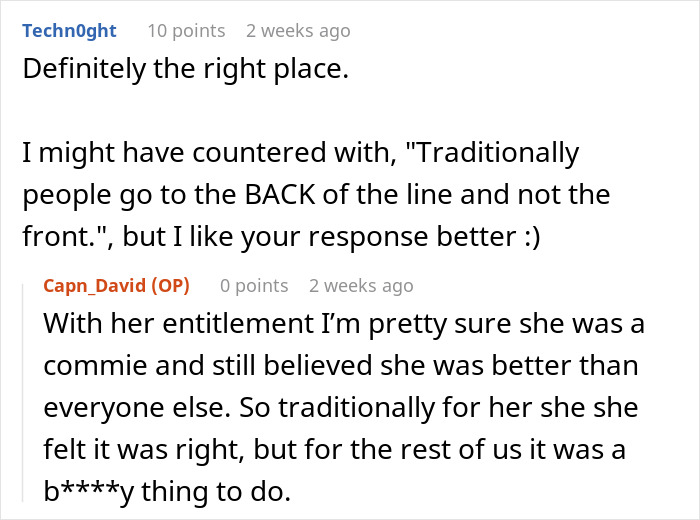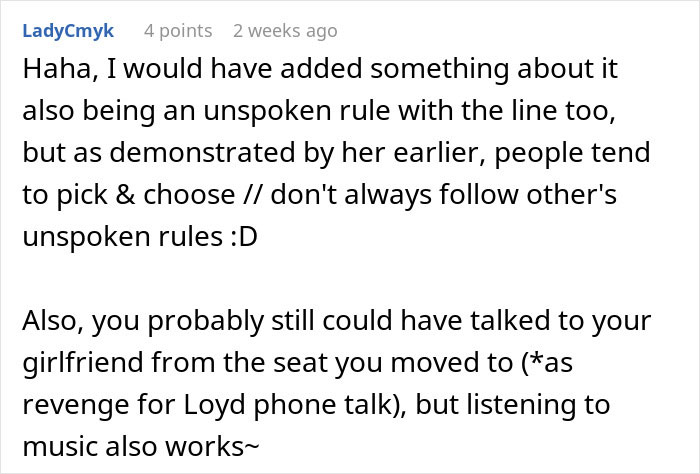
Woman Thinks She’s Entitled To Cut In Line Then Demand Things Be Moved From The Overhead Shelves, So This Man Teaches Her A Lesson
In May, Redditor Capn_David made a post on the subreddit ‘Malicious Compliance,’ describing the time he and his girlfriend were waiting in line to get on a bus in the Czech Republic.
Everyone seemed civil and things were going smoothly until one lady shamelessly cut in front of the couple. Even worse, she decided to give the guy a hard time after they boarded the vehicle about their luggage.
Enough was enough, and Capn_David came up with a petty revenge plan.
This couple patiently waited in line to board a bus in Europe, but a rude lady cut in front of them
Image credits: LightFieldStudios (not the actual photo)
Afterwards, she even made a fuss about their luggage
Image credits: Annie Spratt (not the actual photo)
The guy finally had enough and got back at her in what was probably the least confrontational way possible
Image credits: Aris Sfakianakis (not the actual photo)
Image source: Capn_David
Social norms are the unwritten rules about what is considered acceptable or appropriate in a particular community or culture. Usually they are those things we all just “know” about what is or what should be, and often they are enforced by other people with either rewards or punishments.
However, if we all understand that cutting a line is bad, why do some still do it?
Research tells us that “entitled” people—individuals with a higher sense of entitlement—are more likely to believe that they deserve preferences and resources that others don’t. And they are also less concerned about what is socially acceptable or beneficial.
So a joint study from Cornell and the Harvard Medical School set out to explore the underlying reasons for this. Researchers Emily Zitek and Alexander Jordan first identified those who were more likely to avoid following instructions in a word search. After establishing that people who scored high on measures of “entitled personality” were less likely to follow instructions, they provided a set of scenarios to try to understand why entitled individuals ignored the instructions—selfishness, control, or punishment. But, to their surprise, none of those affected the outcomes. Entitled people still wouldn’t follow instructions; it’s hard to tell entitled individuals how to behave.
Image credits: LightFieldStudios (not the actual photo)
When the experiments turned to the issue of perceived “fairness,” they got more to the source: the entitled people did not follow instructions because they would rather take a loss themselves than agree to something that they perceived as unfair.
Zitek suggested that a challenge for (anyone) who needs to get people with a sense of entitlement to follow instructions is to think about how to frame the instructions to make them seem fairer or more legitimate.
But as psychotherapist Douglas LaBier, Ph.D., said in his comment on the study, good luck with that. Unless you define “fairness” as whatever the entitled individual views as “fair” themselves, they will, most likely, try to walk over you. Or, as it was in this case, past you.
As his story went viral, he provided more information on his experience in the comments
And people thought he handled it beautifully
So I've just wasted minutes of my life reading this non story? Total and utter tosh.
Moral of my story below is - don't act like an arsehole when visiting another country! And please don't p**s off the natives, especially when you're in Scotland! And don't interfere with a volatile crazy Scots chick when she's trying to buy items with her clan name, tartan and crest 🤣🤣🤣🤣
So I've just wasted minutes of my life reading this non story? Total and utter tosh.
Moral of my story below is - don't act like an arsehole when visiting another country! And please don't p**s off the natives, especially when you're in Scotland! And don't interfere with a volatile crazy Scots chick when she's trying to buy items with her clan name, tartan and crest 🤣🤣🤣🤣

 Dark Mode
Dark Mode 

 No fees, cancel anytime
No fees, cancel anytime 















































































43
4